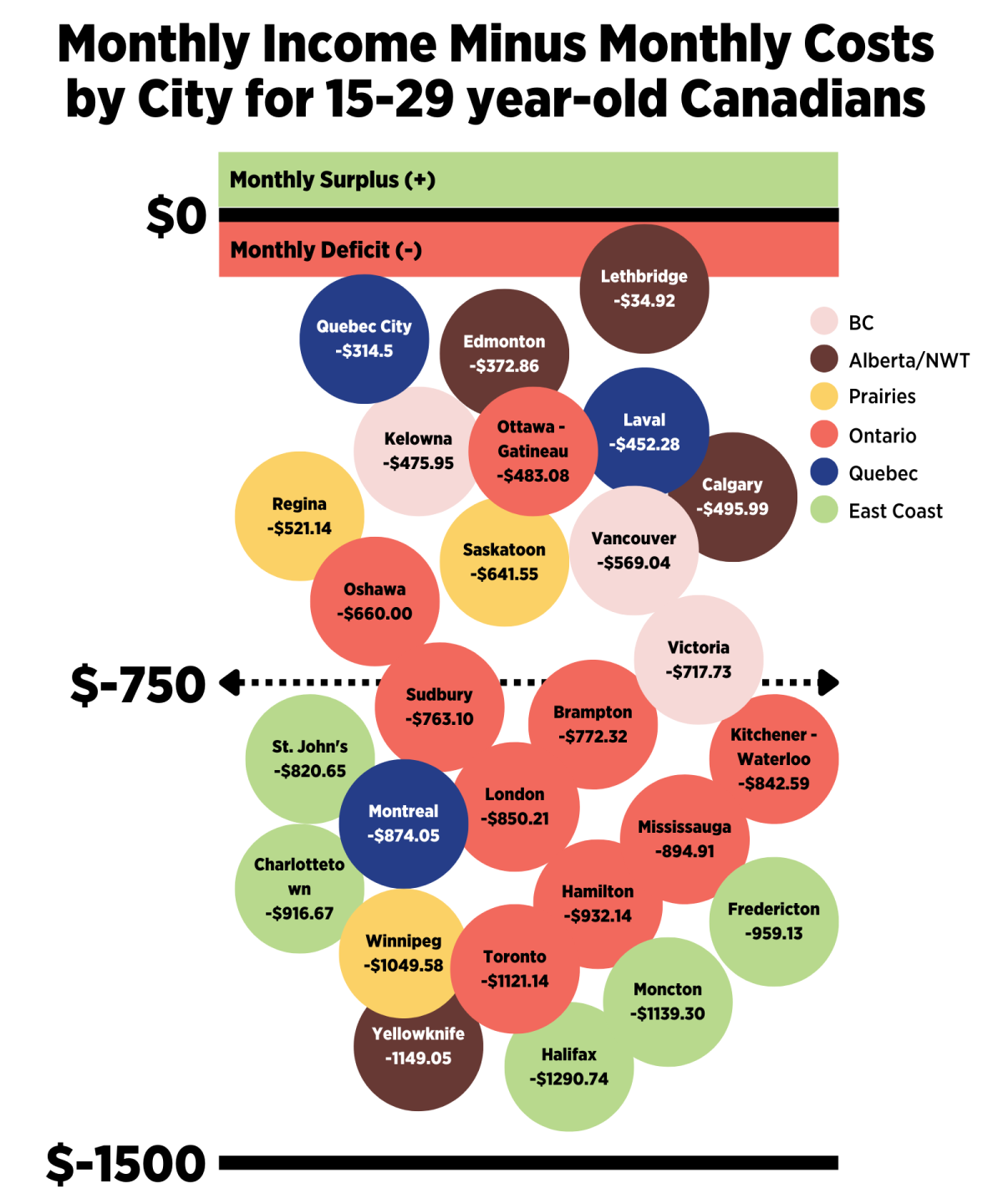Support strong Canadian climate journalism for 2025
Young people face serious financial restraints no matter which city they call home. Last May, Youthful Cities launched its first Real Affordability Index that measured the cost of living across 27 Canadian cities against average incomes for people under 30 years old. The upsetting, though not surprising, result was that in all the communities examined, income did not outpace cost — with the average cost-to-income deficit being around -$750 per month.
Faced with these gloomy findings, we hustled to spread the message. We gathered government officials, solution-makers in the non-profit sector, youth advocates and the voices of young Canadians facing these challenges. The message was clear: Canada needs to do more to ensure young people can meet their needs, so they too can live vibrant, productive lives.
Canada’s fall economic statement is a step in the right direction. Our research identified education, housing and transit as the most significant cost-sucks in young people's monthly budgets. The economic statement addressed two of these: education and housing.
The most notable win is the elimination of federal student loan interest. Education can lead to better income opportunities and stability later in life. Eliminating federal student loan interest is one step closer to making these pathways more accessible. The statement notes half of Canadian post-secondary students rely on student loans to pay for their education. We desperately hope provinces soon follow suit. This will further lessen the burden, and in turn, make their communities more affordable to those just entering the market.
The dream of homeownership is precarious. Real Affordability calculations included all whole-life expenses, based on the metrics given by young people, and beyond the bare minimum survival metrics we often hear touted in affordability conversations. The results, once everything was added up and put against average incomes, were stark — nothing was left for savings.
Creating the new Tax-Free First Home Savings Account is great if you can save money, but our data shows this is only the case for some. More housing support is needed to ensure young people can afford their rent and still have enough left over in their budget to save for a future home. The savings account is a great tool to support a house savings plan, but only if the cost of living is reduced enough to make it viable.
Income distribution across regions and industries also impacts people's budgets. Take Lethbridge, for example. This city was our “winner” when we put all city data together in the index. It had the smallest monthly cost-to-income deficit. Breaking it down even further and comparing the numbers between men and women, we noted Lethbridge had the most significant income gap out of all the cities studied, with men making roughly 20 per cent more than women.
What caused the gap? The Lethbridge data shows a high percentage of men in the trade industry. The trades have higher incomes when compared to the service industry, where 53 per cent of females under 30 are employed.

The economic statement highlighted the launch of the Sustainable Jobs Training Centre where sustainable jobs will stream under the Union Training and Innovation Program, with a mandate to reach underrepresented populations in the trades, including women. We strongly recommend this includes a strong representation of people under 30 to further address future income disparity.
Young people should celebrate these political gains. These wins, like the elimination of federal student loan interest, resulted from their dogged determination within students' unions, on youth councils, or in the research and messages generated in their communities.
Last week, young people from around the world gathered in Sharm el-Sheikh, Egypt, to make their voices heard at the UN climate conference, COP27. Our Youthful Cities team attended another conference of youth voices: the Tamarack Institute's Communities Building Youth Futures' annual gathering. The message we continue to hear from young people is clear — “Include us, take us seriously, and ensure the outcomes reflect the critical perspectives we bring.”
When youth lend their voices and expertise to the decision-making spaces that disproportionately impact their future, they increasingly search for policies and programs that amplify their needs. While we at Youthful Cities are pleased with the progress made in addressing the affordability crisis that is a looming obstacle to our future, we also recognize there is still so much more to do.
The federal government has had a good start with the latest economic statement. Which province will be next to prioritize its youth?
Elise Pundyk is a community convenor and youth advocate based in Mohkinstsis (Calgary, Alta.). As the assistant manager of operations at Youthful Cities, she supports the collection of youth insights and research to build a more sustainable future. She is also a program manager with the Migration Youth and Children Platform, facilitating youth engagement in international policy, including at the Global Forum for Migration and Development and the United Nations High-Level Political Forum. Pundyk is a 2021 Alberta Council for Global Cooperation’s Top 30 Under 30, recognized for her work to engage young people in the 2030 Agenda and migration development.






Comments